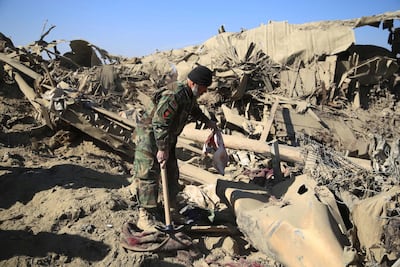As a new administration is installed in the White House, a departing secretary of state has left his successor and the intelligence community a succinct warning: Al Qaeda is operating beneath the radar in Iran and the country has become the terrorist group’s new base of operations.
Mike Pompeo confirmed reports that the second-in-command, Abdullah Ahmed Abdullah, aka Abu Muhammad Al Masri, was assassinated in Tehran in August.
The New York Times reported in November that Al Masri, accused of helping mastermind the 1998 bombings of two US embassies in Africa, was shot dead by Israeli operatives.
Calling Iran "the new Afghanistan" for Al Qaeda militants without providing any hard evidence could prove quite a conundrum for a former CIA director, American counter-terrorism experts told The National.
Mr Pompeo, they said, could be right in his accusations levelled at the Iranian regime, which he made during a speech at the National Press Club in Washington. Allegations included Tehran issuing travel documents to Al Qaeda terrorists and providing sanctuary to some of its leaders since the 9/11 attacks.
But his allegation that Tehran was a “new operational headquarters”, of an organisation which is now greatly weakened and scattered in the form of local franchises, could be also wishful thinking. Al Qaeda has also suffered from rivalry with similar extremist groups, like the now largely defeated ISIS.
“Exaggerating a problem can be just as problematic as disregarding it entirely. I fear that’s exactly what Secretary Pompeo did in his overstated and deeply simplistic statements,” said William Wechsler, director of the Atlantic Council’s Rafik Hariri Centre and Middle East programmes.
Mr Wechsler questioned the timing of the allegations by Mr Pompeo, as they came just as the Trump administration was on the way out the door.
“This does not inspire confidence in their credibility. It is also notable that no current counter-terrorism or intelligence officials came forward to openly validate Pompeo’s full statements, even while the Trump administration was still in office,” he said.

In 2001, the US invaded Afghanistan, one of the consequences of the 9/11 terrorist attacks.
Washington led a coalition of allies, with the support of Nato, in Operation Enduring Freedom.
The George W Bush administration held the Taliban regime in Afghanistan accountable for allowing Al Qaeda to be based in Afghanistan.
Al Qaeda’s remaining militants escaped Afghanistan after the invasion and its leaders expanded their global reach by establishing affiliates in countries such as Iraq, Yemen, Algeria and Somalia.
The 9/11 Congressional commission documented in 2004 longstanding tactical links between Iran and Al Qaeda, going back to the early 1990s.
There have been credible reports that Al Qaeda militants regarded Iran as an alternative sanctuary, instead of embedding with the Taliban in Afghanistan.
Counter-terrorism experts and former US officials have not ruled out a deadly alliance between Iran and Al Qaeda, despite the complicated links between the two entities, which share animosity and sectarian grudges.

Intelligence analysts, however, said such co-operation will be very hard to detect and harder to prove inside Iran.
Iran has denied such accusations in several verbal confrontations with Washington.
On Twitter, Foreign Minister Javad Zarif ridiculed the latest claims made by Mr Pompeo, rejecting them as "warmongering lies".
“(With) fictitious Iran ‘declassifications’ and AQ (Al Qaeda) claims, (Pompeo) is pathetically ending his disastrous career with more warmongering lies,” Mr Zarif tweeted on January 12.
But Mr Wechsler, who previously served at the US Department of Defence as deputy assistant secretary for special operations and combating terrorism, said that it is impossible to believe that Al Qaeda militants have been in Iran without the awareness and approval of the Iranian security apparatus.
“Many were reportedly in their control, being held under ‘house arrest,’” he said.


